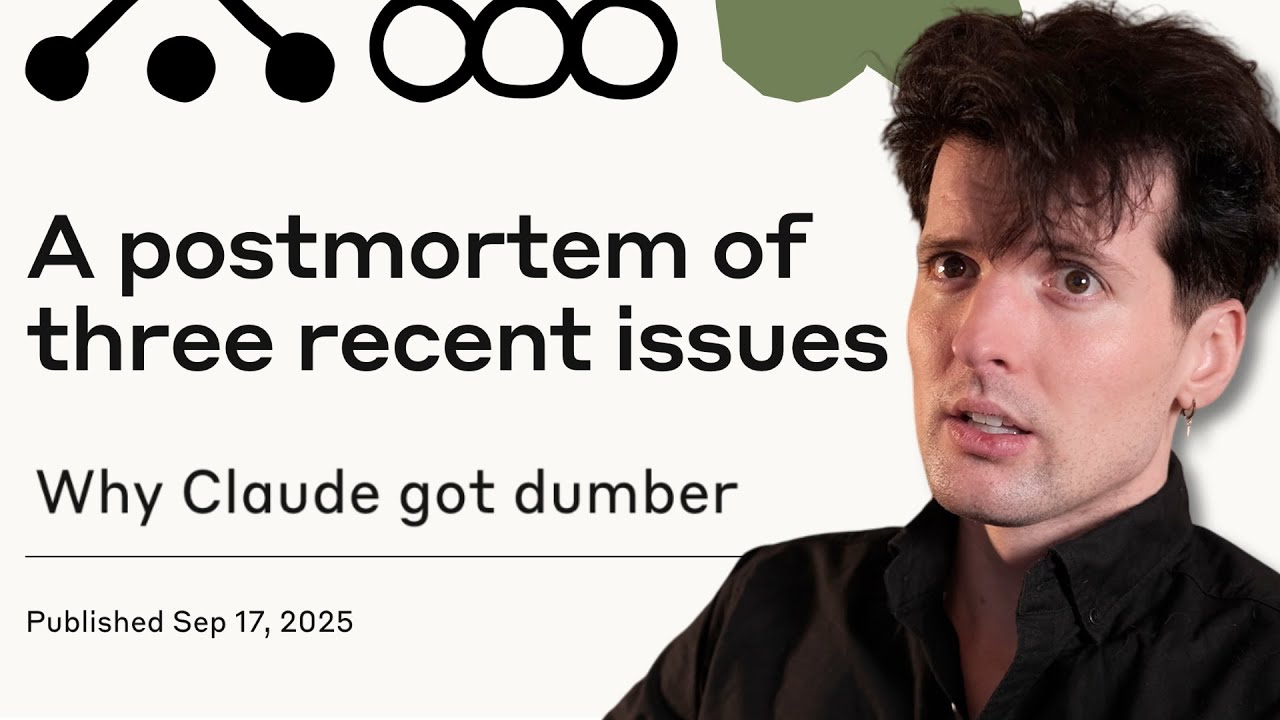Anthropic’s AI model Claude experienced a significant decline in performance due to three infrastructure bugs related to context routing, output corruption, and a top-K sampling optimization, which were only acknowledged after widespread user complaints. While Anthropic has committed to improving transparency, evaluation processes, and remediation, the video criticizes their initial dismissal of issues and lack of compensation, emphasizing the need for openness as reliance on AI models increases.
The video discusses recent issues with Anthropic’s AI model Claude, which experienced a noticeable decline in performance starting in early August. Initially, user complaints about degraded responses were dismissed as normal variation, but by late August, the frequency of reports prompted an investigation. Anthropic eventually acknowledged three separate infrastructure bugs that collectively caused the model to behave “dumber” for several weeks. This admission marked a rare moment of transparency for Anthropic, which typically limits its disclosures to research and benchmark results rather than internal infrastructure problems.
The first bug involved a context window routing error starting August 5th, where about 1% of requests were mistakenly routed to servers configured for a new 1 million token context window version of Claude. This version performed worse on shorter contexts, and a load balancer change on August 29th increased the misrouting to affect up to 16% of requests at peak times. The second bug, beginning August 25th, was an output corruption error caused by a misconfiguration on TPU servers, leading to random unlikely tokens appearing in responses, such as foreign characters or syntax errors in code. This issue affected certain Claude versions on Anthropic’s own platform but not third-party providers.
The third and most complex bug was related to a top-K sampling optimization deployed on August 26th, which triggered a latent compiler bug in the TPU implementation. This bug caused the model to sometimes drop the highest probability token during text generation due to precision mismatches between different floating-point formats used in calculations. The problem was difficult to diagnose because it manifested inconsistently depending on batch sizes, debugging tools, and other unrelated factors. Anthropic eventually switched from an approximate to an exact top-K method to fix this, accepting a minor efficiency loss to preserve model quality.
Anthropic’s motivation behind some of these changes was to reduce the computational cost per request, thereby freeing up GPU resources for their internal research teams. While they did not intend to degrade model quality, the aggressive optimizations and rushed deployments contributed to the issues. The video criticizes Anthropic for initially ignoring user feedback, lacking robust internal monitoring to detect quality degradation, and for not offering refunds or compensation to affected users despite the severity and duration of the problems.
In response to these incidents, Anthropic has committed to improving their evaluation processes with more sensitive and continuous quality checks, better debugging tools that respect user privacy, and faster remediation workflows. The video praises this newfound transparency but urges Anthropic to maintain it and to take stronger ownership of future issues, including compensating users when service quality drops. The overall message stresses the importance of openness and communication from AI providers as reliance on large language models grows, given their inherent non-deterministic and sometimes unreliable nature.
